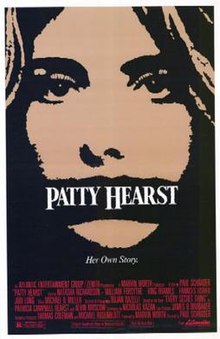

| Patty Hearst | |
|---|---|

Film poster
| |
| Directed by | Paul Schrader |
| Screenplay by | Nicholas Kazan |
| Based on | |
| Produced by | Marvin Worth |
| Starring |
|
| Cinematography | Bojan Bazelli |
| Edited by | Michael R. Miller |
| Music by | Scott Johnson |
| Distributed by | Atlantic Releasing |
Release date |
|
Running time | 108 minutes |
| Country | United States |
| Language | English |
| Box office | $1,223,326 |
Patty Hearst is a 1988 American biographical crime drama film directed by Paul Schrader. The film stars Natasha RichardsonasHearst Corporation heiress Patricia Hearst and Ving RhamesasSymbionese Liberation Army leader Cinque. It is based on Hearst's 1982 autobiography Every Secret Thing (co-written with Alvin Moscow), which was later rereleased as Patty Hearst – Her Own Story.
The film depicts the kidnapping of student Patty Hearst by the Symbionese Liberation Army, her transformation into an active follower of the SLA after a long-lasting imprisonment and process of purported brainwashing, and her final arrest after a series of armed robberies.
Members of the Symbionese Liberation Army kidnap Patty Hearst from her Berkeley apartment and take her to their safe house, where she is kept blindfolded in a closet. Her captivity is interrupted by brief lessons in the SLA's teachings and, eventually, offers of sex. She is told by the group's leader, "General Field Marshall" Cinque, that she is being used for bargaining for the release of two captive comrades, an offer eventually refused by the state. In its place, the SLA devise a program for the Hearsts to donate $70 to every poor Californian.
As negotiations begin to break down in this recent attempt, Cinque informs Patty that the War Council has to decide what to do with her. As she is slowly ingratiated in the group, she is given the choice to join or go home, though the latter option is reinforced with a bottle tapping on her leg, a reminder to "join or die".
After undergoing a series of tests, Patty is brought into the SLA as a member and given the name Tania. She poses for pictures with the group and records lines to give to the media while undergoing military drills. The group plans a bank robbery and pick the Hibernia Bank as the site. Though the robbery is successful, Patty is unable to recite her prepared speech.
The group acquires a vehicle from a family of Black Muslim neighbors and move to Los Angeles. While out with Teko and Yolanda, Teko is nearly arrested for stealing and Patty shoots at the police to enable their escape. Hiding out at a motel, the group learn that the SLA's main safe house has been raided and watch the subsequent shootout on television, in which the members besides themselves are killed.
The trio move to Pennsylvania to stay at the home of SLA member Wendy, who is somewhat disillusioned with the cause following the arrest of a comrade. They meet up with an SLA chapter in San Francisco and continue performing bank robberies and bombing police cars. Teko and Yolanda split from the group in search of a black leader and the apartment is later raided by the FBI, leading to Patty and Wendy's arrest.
Patty's attorney has psychiatrists subject her to a range of probing questions about her captivity. Yolanda, situated in a cell adjacent to Patty's, tells her that they should have killed her a long time ago. In the subsequent trial, Patty is cross-examined and she is found guilty on the charges of bank robbery and using a firearm during the commission of a felony.
Later, Patty explains to her father her strategy to change the public's perception of her and that she was guilty of one crime; living.
The film was written by Nicholas Kazan (son of Oscar-winning director Elia Kazan) drawing narration from Hearst's memoir.[1]
Patty Hearst premiered at the 1988 Cannes Film Festival on May 13 in the feature film competition.[2] The film opened on September 23, 1988, in the US and grossed $601,680 in its opening weekend. It made a total domestic gross of $1,223,326.[3]
The film garnered a generally mixed critical response, although Richardson's performance was applauded by most critics. Amongst credited critics, the film has a rating of 54% positive reactions on Rotten Tomatoes, with 13 reviews counted.[4] Vincent CanbyofThe New York Times wrote that "Patty Hearst is a beautifully produced movie, seen entirely from Patty's limited point of view. It is stylized at times, utterly direct and both shocking and grimly funny."[5] Roger Ebert writing for the Chicago Sun-Times praised Richardson's performance: "The entire film centers on the remarkable performance by Natasha Richardson as Hearst." but concluded that "This whole story seemed so much more exciting from the outside."[6]
Pauline Kael called the film "a lean, impressive piece of work" and even suggested that it answered the longstanding mystery about Hearst: "Did Patty Hearst become part of the S.L.A. willingly, out of conviction, or was she simply trying to save her life? The movie shows you that, in the state she was in, there was no difference. Natasha Richardson, who plays Patty, has been handed a big unwritten role; she feels her way into it, and she fills it. We feel how alone and paralyzed Patty is — she retreats to being a hidden observer. Patty is a girl who is raped in mind and body, and no longer knows when it started."[7]
|
Films by Paul Schrader
| |
|---|---|
| Directed |
|
| Written only |
|